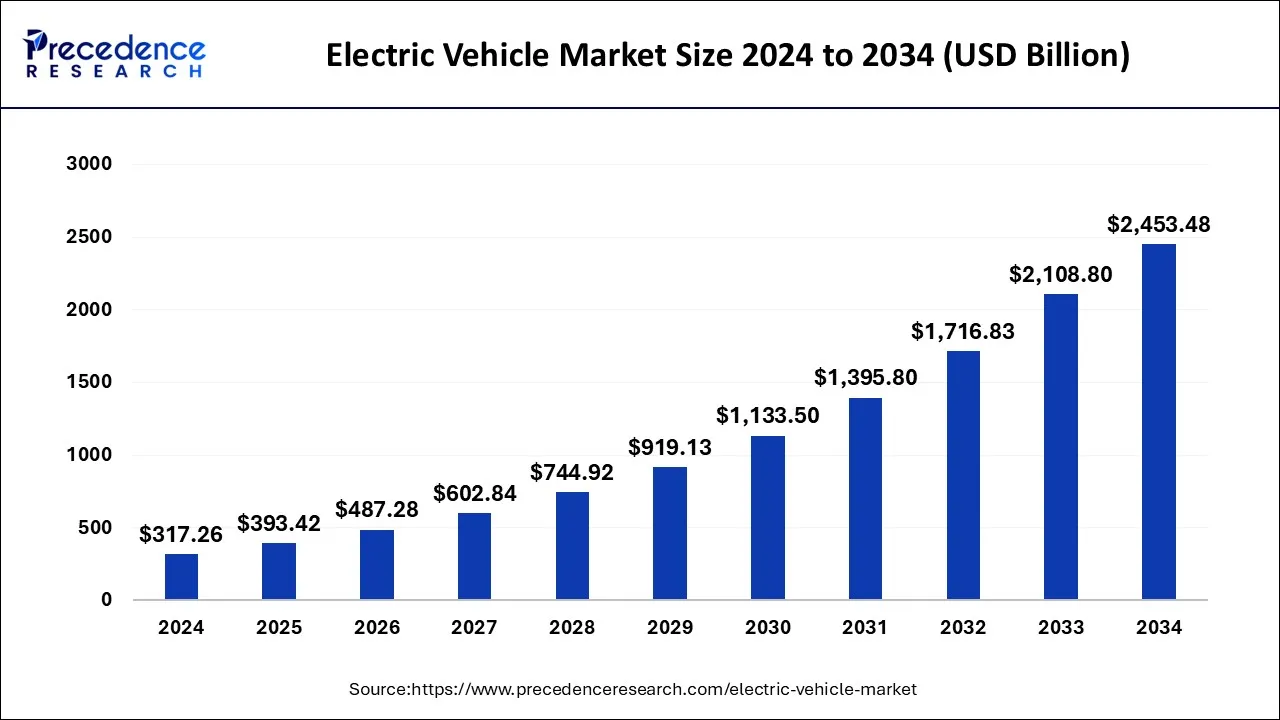The global Electric Vehicle Market was valued at USD 317.26 billion in 2024 and is expected to reach USD 2,453.48 billion by 2034, growing at a CAGR of 22.69%.
Electric Vehicle Market Key Insights
- Asia Pacific led the market with a 42.14% revenue share in 2024.
- The Asia Pacific EV market was valued at USD 107.68 billion in 2024.
- Battery Electric Vehicles (BEVs) held the largest revenue share of 67.7% in 2024.
- The passenger car segment accounted for 62.4% of total revenue in 2024.
- Europe aims for a 40% reduction in greenhouse gases by 2040 and net zero by 2050.
- In 2021, 86% of newly registered cars in Norway and 64% in Iceland were electric.
- The hybrid EV market, valued at USD 77,581.7 million in 2021, is projected to reach USD 301.67 billion by 2030.
- The plug-in hybrid EV segment is expected to generate USD 385,617 million in revenue from 2025 to 2034.
- The passenger car EV market, valued at USD 127,394 million in 2021, is projected to reach USD 598,735 million by 2030.
- The commercial vehicle EV market was valued at USD 47,351.9 million in 2024.
- The luxury EV market, valued at USD 104,380 million in 2021, is expected to reach USD 441,273 million by 2030.

The electric vehicle (EV) market has experienced significant growth over the past decade, driven by technological advancements, environmental concerns, and supportive government policies. EVs, encompassing battery electric vehicles (BEVs) and plug-in hybrid electric vehicles (PHEVs), have transitioned from niche products to mainstream transportation options. In 2023, global EV sales reached approximately 17 million units, accounting for one in every five cars sold worldwide. China led this surge, with new energy vehicles (NEVs) comprising over 50% of its auto sales in July 2024.
Sample Link: https://www.precedenceresearch.com/sample/1009
Market Drivers
Several factors propel the EV market forward. Environmental awareness has heightened demand for cleaner transportation solutions, as EVs offer reduced greenhouse gas emissions and lower air pollution compared to traditional internal combustion engine (ICE) vehicles. Technological innovations have improved battery efficiency, extended driving ranges, and decreased production costs, making EVs more accessible to consumers. Government incentives, such as subsidies, tax breaks, and stringent emission regulations, further encourage both manufacturers and consumers to embrace electric mobility. For instance, China’s aggressive policies and subsidies have significantly boosted its domestic EV adoption.
Opportunities
The expanding EV market presents numerous opportunities. Automakers are investing heavily in EV development, with companies like Volkswagen planning to introduce multiple electric models in the coming years. The growth of EVs stimulates advancements in related sectors, including battery manufacturing and charging infrastructure. Emerging markets, particularly in Asia, offer vast potential for EV adoption due to urbanization and increasing environmental concerns. Additionally, the integration of renewable energy sources with EV charging stations promotes a sustainable energy ecosystem.
Challenges
Despite positive momentum, the EV industry faces challenges. High upfront costs, limited charging infrastructure, and concerns about battery longevity deter some consumers. In regions like the United States and Europe, EV adoption has been slower than anticipated, partly due to political uncertainties and reduced government incentives. For example, the election of a U.S. president opposed to EV subsidies has introduced uncertainty into the market. Moreover, disparities in EV adoption rates between urban and rural areas highlight the need for more widespread infrastructure development.
Regional Insights
China dominates the global EV landscape, accounting for approximately 58% of worldwide EV consumption in 2023. Aggressive government policies, substantial investments, and a competitive market have propelled China’s EV industry. In contrast, Europe has seen fluctuating EV sales, with a 5.8% decline in electric-only car sales in early 2024, reducing their market share to 13%. The United States, while experiencing growth in EV sales, still faces consumer hesitancy due to factors like range anxiety and charging infrastructure limitations. Notably, electric car sales in the UK reached a milestone, accounting for 25.1% of new car registrations in November 2024.
Read Also: Electric Vehicle Charging Cables Market
